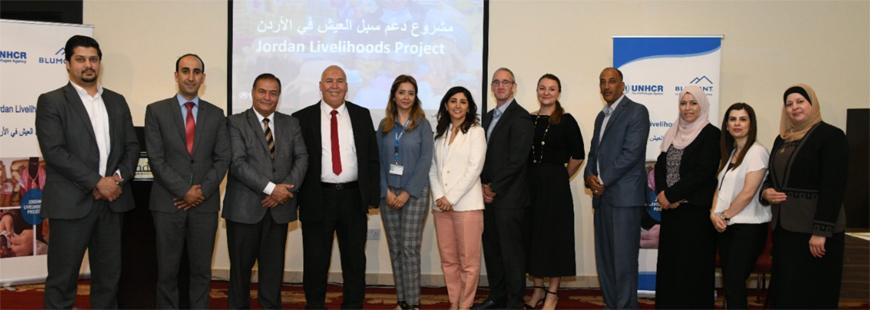You are here
UNHCR, Blumont join hands to foster sustainable local economic development
By Batool Ghaith - Jun 15,2022 - Last updated at Jun 16,2022

Guests pose for a photo during a signing ceremony, where UNHCR Jordan and Blumont, an NGO that provides relief for refugees and host populations, signed six agreements with various community-based organisations, on Wednesday (Photo courtesy of Blumont)
AMMAN — UNHCR Jordan and Blumont, an NGO that provides relief for refugees and host populations, on Wednesday signed six agreements with various community-based organisations (CBOs) to foster sustainable local economic development and enhance local communities.
The signing ceremony took place in Amman, where CBOs from Irbid, Mafraq, Salt, Maan, Ajloun and Karak signed the agreements with Blumont.
As part of the Jordan Livelihoods Project, funded by the UNHCR, the six CBOs were chosen from 51 different organisations based on a study on the needs of the local community, according to Blumont Jordan Country Director Caroline Haddad.
Blumont works on improving CBOs by providing them with tools and equipment to support and ensure their sustainability, productivity and innovation, Haddad said.
“We recognise the need to scale up home-based businesses into small- and medium-sized enterprises, as they play a significant role in economic growth and job creation,” Haddad said.
According to Haddad, Blumont has supported 262 home-based businesses.
Dominik Bartsch, UNHCR representative in Jordan, said in a Blumont statement that the success of home-based businesses over the last few years has been “tremendous”, but it needs to be taken one step further.
“This agreement and working with local community organisations will help widen the reach and expand the customer base for Jordanian and Syrian entrepreneurs,” he said.
UNHCR Jordan Associate Livelihoods and Economic Inclusion Officer Najwan Al Dorgham said that the UN agency and Blumont started supporting both Syrian refugees and Jordanians to formalise their home-based business following the 2016 Jordan Compact, which supported the right of Syrian refugees to work formally in the Jordanian labour market and run home-based businesses.
“Blumont is a strategic partner for UNHCR Jordan,” Dorgham said, noting that Blumont was the first organisation to register refugee home-based businesses.
“We are looking forward to keep collaborating with the Ministry of Labour, in hopes of expanding sectors in which refugees are allowed to work,” Dorgham said.
She highlighted the “barriers” facing home-based businesses, including high financial requirements and the need to obtain landlords approval for business operation.
“Home-based businesses are a good alternative for refugees to face the challenges in the labour market as it provides flexibility, particularly for women,” Dorgham said.
According to Dorgham, the first home-based business owned by a Syrian refugee was registered in December 2019 through the UNHCR and Blumont partnership.
Mohammad Qudah, director of the charitable society Jabal Ajloun, one of the CBOs that signed the agreement, told The Jordan Times that the Livelihoods Project contributes to achieving a number of the organisation’s goals, particularly by providing a source of income for families and building the organisation’s capabilities through training.
“It is highly important for the organisation to integrate with the local community and network with relevant organisations, municipalities and departments to achieve our goals,” Qudah said.
Since 2019, the Livelihoods Project has helped to formalise 296 home-based businesses, 62 of which were Syrian, and all home-based businesses are registered and licensed through the Ministry of Industry and Trade and the Ministry of Local Administration, Blumont stated.
Related Articles
AMMAN — Blumont, an NGO that works for the benefit of refugees and host populations, with support from UNHCR, on Wednesday announced that it
AMMAN — Blumont, an NGO that works for the benefit of refugees and host populations, and the European Bank for Reconstruction and Developmen
AMMAN — Abeer, a 36-year-old Jordanian woman and mother of four, was forced to take control of her family’s finances after the death of her

















